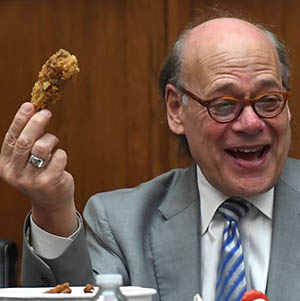Senior Reporter
Agreement Solidifies First Victory for Trump’s Attempts at ‘Infrastructure Week’

The April 30 meeting between the Builder-in-Chief and congressional Democrats, during which they agreed on a $2 trillion infrastructure package, was held behind closed doors to help minimize messaging snafus.

Mulero
President Donald Trump’s previous attempts at showcasing his infrastructure bona fides have fizzled somewhat spectacularly, to say the least. Pundits coined the phrase “infrastructure week,” a colloquial term for when the Trump White House fails to promote such policy due to any number of high-profile reasons.
What we know about this new agreement is that it would focus on traditional surface transportation programs, such as roads, bridges and tunnels. Negotiators also will look to expand access to broadband.
The next step is to discuss funding. The Democrats, Speaker Nancy Pelosi indicated, want Trump to lead the way on funding negotiations, which are expected to take place in less than three weeks. That will be a make-or-break moment for infrastructure policy in the 116th Congress. Mick Mulvaney, acting White House chief of staff, suggested international trade talks would be easier to negotiate than a big-ticket infrastructure package. And for good reason.
Democrats want “real” money behind the effort, which could mean potentially raising the federal gas tax. Most top Republicans, especially in the Senate, oppose that approach. Republican leaders also object to using an infrastructure package as a vehicle for addressing climate change. Not to mention, funding discussions will go nowhere fast if Democrats attempt to roll back provisions in the 2017 tax law. The top Republican in the Senate, Kentucky’s Mitch McConnell, said tweaking the tax law would be a nonstarter.
Last week, we also learned Trump was not enthusiastic about his team’s infrastructure plan last year. The 10-year, $1.5 trillion proposal unveiled in February 2018 relied primarily on nonfederal funds.

Zach Schafer (left ) and Mulero discussed Infrastructure Week during a Transport Topics podcast in 2017. Fast forward two years, and the same concerns are as pressing as ever. (Transport Topics via YouTube)
Around the time negotiators meet again, the actual Infrastructure Week advocacy forum will take place. The kickoff in Washington is scheduled for May 13. The transportation community will be out in full force to raise awareness about traffic congestion, old pipelines and deficient bridges. Zach Schafer, the event’s director, recently told us, “This is an important moment for everybody, every sector, every part of the country to come together and say, ‘This is something that we need. And Congress and the administration should work together on this.’”
The Week Ahead (all times Eastern)
Spotlight Hearing

Carper
May 8, 10 a.m.: When the Environment and Public Works Committee in the Senate meets to review the Army Corps of Engineers, Democrats in the minority are expected to raise concerns regarding climate change. They have been promoting climate resilience policy, with the goal of including it in a comprehensive infrastructure package. As EPW ranking Democrat, Sen. Tom Carper put it, “It’s time we stop throwing good money after bad, and start investing in roads, highways, bridges and transit systems that will harness innovation and withstand the impacts of our changing climate.”
May 7, 10:30 a.m.: The Association of American Railroads hosts an event titled, “RailxTech.” Keynote speakers include James Ray, the former senior infrastructure adviser at the U.S. Department of Transportation.
May 8, 8 a.m.: The Washington Post’s Robert Costa speaks with Speaker Nancy Pelosi (D-Calif.).
May 8, 10 a.m.: The House Transportation and Infrastructure Committee marks up the Full Utilization of the Harbor Maintenance Trust Fund Act (H.R. 2440), DISASTER Act (H.R. 1984), and the Transparency in Federal Buildings Projects Act of 2019 (H.R. 2502).
May 8, 10 a.m.: The Senate Commerce Committee hosts a hearing titled, “New Entrants in the National Airspace: Policy, Technology, and Security Issues for Congress.” Witnesses include Jay Merkle, executive director of the Unmanned Aircraft Systems Integration Office at the Federal Aviation Administration; Wayne Montieth, associate administrator at the Office of Commercial Space Transportation at the Federal Aviation Administration; Dallas Brooks, director at the Raspet Flight Research Laboratory at Mississippi State University; Zach Lovering, vice president at the Urban Air Mobility Systems at Airbus; and Eric Stallmer, president at Commercial Spaceflight Federation.
May 8, 2 p.m.: The House Coast Guard and Maritime Transportation Subcommittee hosts a hearing titled, “The Cost of Doing Nothing: Maritime Infrastructure Vulnerabilities in an Emerging Arctic.”
May 9, 9 a.m.: The Center for Strategic and International Studies hosts a panel on U.S. aid to Guatemala, Honduras and El Salvador.
Mood Swings
There’s a $2 trillion agreement on infrastructure policy, without a way to pay for it. Look at it this way: The glass is half full.
In Case You Missed It
America has been Infrastructure Week-ing for several centuries.
Who’s New

Cohen had a bone to pick with Barr for not appearing at a House oversight hearing May 2. (Guardian News via YouTube)
Rep. Steve Cohen sought to make comedic props en vogue last week.
At a House oversight hearing on May 2, Cohen, a Tennessee Democrat, brought a ceramic chicken and a bucket of KFC to imply Attorney General William Barr was behaving cowardly.
Barr had opted not to appear before the panel. Some individuals rely on words to deliver a message, others use objects.
“While the props were in [jest]," Cohen said, "I am acutely aware of how close we are to a serious constitutional crisis when the executive branch essentially declines to have its actions reviewed by Congress, a co-equal branch of our government.”
 Buzz
Buzz

When an infrastructure bill is ultimately considered, Democrats say they will push climate change policy, as well as access to transit. A small number of Republicans are expected to advocate for private sector involvement and a vehicle-miles-traveled system of funding.
Favorite Video
What about congestion pricing.
Favorite Tweet
The gospel according to Musk.
Tesla Semi truck spotted on one of Los Angeles' busiest freeways with trailer and massive concrete blocks in tow https://t.co/Qt17Qvlk55 — TESLARATI (@Teslarati) May 3, 2019
The Last Word
The fuel tax is the one funding tool in the toolbox that pays for itself by users. It is the most effective, efficient and yes, conservative, way of generating the amount of money we need to do the job.
American Trucking Associations President Chris Spear on April 30
We publish weekly when Congress is in session. E-mail emulero@ttnews.com with tips. Follow us @eugenemulero and @transporttopics.



